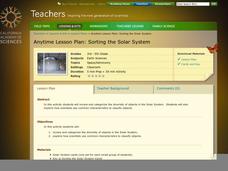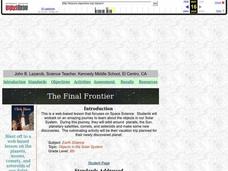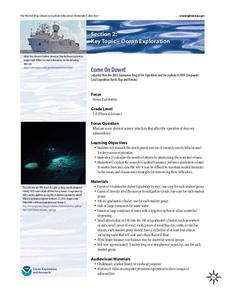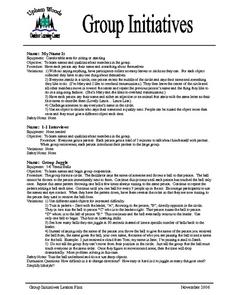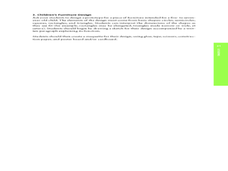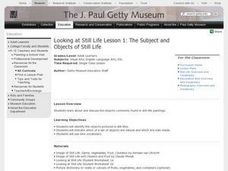Curated OER
Identify the Biggest Object
In this early childhood size comparison worksheet, students examine the 4 groupings of fruit and circle the biggest fruit in each of the 4 groupings.
Curated OER
Identify the Smallest Object
In this early childhood size comparison worksheet, students examine the 4 groupings of vegetables and circle the smallest vegetable in each of the 4 groupings.
California Academy of Science
Sorting the Solar System
Scientists are always sorting and classifying objects based on their characteristics. In a hands-on learning activity, young space explorers work together to categorize solar system cards based on their properties. It is up to the young...
Curated OER
Scale Model of the Solar System
Young scientists gain a better understanding of space, the solar system and its vastness by creating a scale model. Students first need to calculate the distance between each of the nine planets according to the size of their scale. This...
Curated OER
Planets in Our Solar System
Each member of a four-student group takes on a specific aspect of an assigned planet to research. After gathering information, the team works together to create a travel brochure and a presentation intended to convince other classmates...
Teach Engineering
What a Drag!
Stop and drop what is in your hand! Pupils investigate how form effects drag in the 12th part of a 22-part unit on aviation. Groups create equally weighted objects and determine which one falls the fastest by collecting data.
Curated OER
Multiplication as Repeated Addition
For beginners, present multiplication as repeated addition to give them a familiar context. They examine grouped sets of objects and add up the groups to get a total. Then, learners translate the addition sets to a basic multiplication...
Curated OER
We All Scream for Ice Scream
High schoolers explore the formulas for volume of three-dimensional objects. They participate in various activities involving ice cream, ice cream cones, small candies, and gum balls, recording their calculations on a lab sheet.
Curated OER
Round-Robin Reading Quiz
Small groups of learners read text round-robin style, and then work individually to answer three questions based on the text. Next, they share their questions and responses and add ideas from the group. The reading strategies detailed...
NOAA
Come on Down!
What do we do when a dive is too dangerous for humans to accomplish? Send in the robots! Middle school scientists get acquainted with several different models of submersible robots in the second lesson of six from NOAA. Lab groups then...
American Chemical Society
Protons, Neutrons, and Electrons
Atomic bombs harness the power in the nucleus of an atom, creating devastating power and damage. Classes review parts of an atom by charging a piece of plastic and holding it near their fingers, discussing what is happening and why....
Curated OER
Seeing the Image in Imagery: A Lesson Plan Using Film
In our increasingly visual society, it is often difficult for some readers to create a mental picture of a picture created only with words. An image-rich text like F. Scott Fitzgerald's The Great Gatsby can therefore, present a real...
DiscoverE
Design a Shoe
Engage young scientists in a project where high fashion meets engineering! Using foam core and hot glue, partnered pupils design and create a functional, fashionable pair of shoes. Groups then put the footwear through its paces using a...
It's About Time
Organizing a Store
When provided with multiple objects, how many ways can the class organize and display them based on predetermined factors? Assist class members with a handy activity—theoretically teaching them concepts to understand periodic table...
Curated OER
Group Initiatives
Students explore the names and qualities about members in the group. They each say their name and something about themselves. Students gather around in a circle. They listen to the teacher as he or she says the name of someone and throws...
Curated OER
History at Home: The Object Box
Students examine "artifacts". In this anthropology lesson, students analyze possible uses for objects such as washboards, hot water bottles, and old magazines. Students record and share their speculations with their classmates.
Curated OER
Sorting Objects
First graders experiment with sorting. In this sorting lesson, 1st graders separate objects according to one attribute: smooth, rough, hard or soft.
Curated OER
Symmetry in Shapes and Everyday Objects
Fifth graders discover lines of symmetry for shapes and everyday objects. In this lines of symmetry lesson, 5th graders use a butterfly outline to find lines of symmetry. Students analyze everyday objects for symmetry and use...
Curated OER
Sorting Objects
Students sort objects by color. In this classification lesson, students identify the color of the objects and categorize them according to color.
Curated OER
Everyday Objects: Eskimo Life
Young scholars describe the pioneering work of researcher Edward W. Nelson and identify everyday objects that aid in understanding a culture. In this everyday objects lesson, students conduct their own research into everyday objects by...
Curated OER
Everyday Objects
Students investigate different cultures based on the everyday objects of that culture. First, they explore Edward W. Nelson, who explored the Alaska region and first learned about the Eskimo culture.
Curated OER
Ideal Objects
Students make connections between two design objects intended for different purposes and analyze the social and political meaning in the designs. In this design analysis lesson, students complete image based discuss activities. Students...
Curated OER
Looking at Still Life Lesson 1: The Subject and Objects of Still
Students explore and discuss the objects commonly found in still-life paintings. They identify the objects pictured in still lifes indicating which objects are natural and which are man-made.
Curated OER
Counting In Groups Of 10
In this counting in groups of ten worksheet, students count ten dots and circle them in six boxes, write how many ten-groups they get and then write how many ones are left over.




